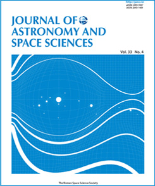
Journal of Astronomy and Space Sciences
metrics 2024
Illuminating the Universe Through Rigorous Research.
Introduction
The Journal of Astronomy and Space Sciences, published by the Korean Space Science Society, is a premier open-access platform dedicated to advancing the fields of astronomy, astrophysics, and space sciences. Established in 1984, the journal has been instrumental in disseminating high-quality research findings, fostering collaboration among scientists globally, and providing insights into the dynamics of our universe. With an ISSN of 2093-5587 and an E-ISSN of 2093-1409, the journal has gained notable recognition, currently ranking in the Q3 quartile in Earth and Planetary Sciences and Physics and Astronomy as of 2023. Although the journal's H-Index is currently unspecified, its commitment to rigorous peer-review processes and open-access availability ensures that groundbreaking research is accessible to a wide audience. Based in Seoul, South Korea, the journal is poised to continue supporting innovative research through 2024 and beyond. Researchers, professionals, and students alike will find valuable resources and opportunities within its pages, further establishing this journal as a crucial resource in the exploration of the cosmos.
Metrics 2024
 0.25
0.25 0.60
0.60 0.50
0.50 15
15Metrics History
Rank 2024
Scopus
IF (Web Of Science)
JCI (Web Of Science)
Quartile History
Similar Journals
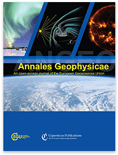
ANNALES GEOPHYSICAE
Connecting Ideas in Astronomy, Atmospheric Science, and Earth ScienceANNALES GEOPHYSICAE is a distinguished open access journal published by COPERNICUS GESELLSCHAFT MBH, renowned for its contributions to the field of geophysics and related disciplines. Since its inception in 1996 as an open access journal, ANNALES GEOPHYSICAE has provided a vital platform for researchers to disseminate their findings covering a wide array of topics within Astronomy and Astrophysics, Atmospheric Science, and Earth and Planetary Sciences. The journal enjoys a commendable reputation, evidenced by its impressive 2023 category quartiles, ranking Q1 in Earth and Planetary Sciences (miscellaneous) and Q2 in several other relevant categories, reflecting its significance in the global research community. Based in Germany and accessible to a diverse audience, ANNALES GEOPHYSICAE serves as an essential resource for academics, practitioners, and students alike, striving to foster advancements in our understanding of geophysical phenomena and encouraging collaboration across disciplines.

Romanian Astronomical Journal
Elevating the discourse in Astronomy and Astrophysics.Welcome to the Romanian Astronomical Journal, a distinguished publication operating under the esteemed EDITURA ACAD ROMANE, dedicated to advancing the field of Astronomy and Astrophysics. With a rich tradition rooted in Romania, this journal aims to foster scholarly discourse and disseminate pivotal research findings within the cosmic sciences. Although currently not designated as Open Access, the journal remains committed to ensuring that its content meets rigorous academic standards. The Romanian Astronomical Journal holds a commendable position in the academic community, achieving a Q3 ranking in Astronomy and Astrophysics and a Q4 ranking in Space and Planetary Science for 2023, reflecting its contribution to the scientific landscape. With a focus on originality and scholarly excellence, this journal serves as a vital resource for researchers, professionals, and students alike, promoting a deeper understanding of the universe and our place within it. Positioned at the intersection of innovative research and practical application, the Romanian Astronomical Journal invites contributions that push the boundaries of knowledge in our field.

SPACE SCIENCE REVIEWS
Your Gateway to Cutting-Edge Space ResearchSPACE SCIENCE REVIEWS, published by Springer, is a premier interdisciplinary journal that has been at the forefront of space science research since its inception in 1962. With an impressive impact factor and a distinguished Q1 ranking in both Astronomy and Astrophysics, as well as Space and Planetary Science, it stands as a leading platform for the dissemination of cutting-edge research. The journal encompasses comprehensive reviews covering a diverse array of topics, from cosmic phenomena to planetary exploration, serving as a critical resource for researchers, professionals, and students alike. Although it operates primarily under a subscription model, its commitment to excellence and rigorous peer-review process ensures that each article meets the highest standards of scientific integrity. With its headquarters in the Netherlands, SPACE SCIENCE REVIEWS is positioned strategically to foster global collaboration in the field, making it an invaluable asset for anyone interested in the ever-evolving landscape of space science.

Kinematics and Physics of Celestial Bodies
Bridging Kinematics and Cosmic InsightsKinematics and Physics of Celestial Bodies is a prominent journal published by PLEIADES PUBLISHING INC, dedicated to the exploration and understanding of celestial mechanics and the physical properties of astronomical bodies. With an ISSN of 0884-5913 and an E-ISSN of 1934-8401, this journal has established itself as a resource for researchers in the fields of astronomy, astrophysics, and space science since its inception in 2009. The journal is indexed in Scopus, where it currently ranks in the fourth quartile for both Astronomy and Astrophysics and Space and Planetary Science, making it a valuable platform for scholarly discourse despite its ranking. Its scope encompasses a range of topics related to the kinematics and physical characteristics of celestial objects, aiming to facilitate a better understanding of their dynamics and interactions within the universe. Although it does not operate under an open access model, the journal provides essential insights and findings, catering to the academic needs of researchers, professionals, and students engaged in the study of the cosmos. The journal's commitment to advancing knowledge in the various aspects of celestial physics ultimately contributes to the broader scientific community's endeavors.

Journal of the Korean Astronomical Society
Innovative Discoveries: Shaping the Future of Space ScienceWelcome to the Journal of the Korean Astronomical Society, an esteemed publication dedicated to advancing the fields of Astronomy and Astrophysics as well as Space and Planetary Science. Established in 1993 and under the reputable auspices of the Korean Astronomical Society, this journal serves as a vital platform for researchers and scholars from South Korea and around the globe to disseminate innovative findings and critical insights. With a commendable Q2 ranking in Astronomy and Astrophysics and a Q3 ranking in Space and Planetary Science, this journal is positioned among the influential voices in its fields, fostering collaboration and knowledge exchange. The journal's rigorous peer-review process ensures that published works contribute significantly to ongoing discussions and developments in astronomical research. While currently not an open-access journal, it remains accessible to the academic community, encouraging readers to stay abreast of the latest advancements in the sciences that elucidate the universe's complexities. Join us in exploring the cosmos through cutting-edge research and scholarly discussion that propels the field forward.

EARTH PLANETS AND SPACE
Fostering Innovation in Earth and Planetary StudiesEARTH PLANETS AND SPACE, published by Springer and based in Switzerland, is a distinguished journal that plays a pivotal role in advancing the fields of Earth and planetary sciences. With an impactful presence in both geology (Q1) and space and planetary science (Q2), this journal is increasingly recognized for its contributions to understanding complex geoscientific processes and extraterrestrial phenomena. The journal has been a vital resource for researchers since its inception in 1996 and is anticipated to continue this legacy until at least 2024. It ranks impressively within the Scopus database, holding the 53rd position out of 321 in Earth and Planetary Sciences for Geology and the 30th position out of 104 for Space and Planetary Science, reflecting a robust percentile standing of 83 and 71, respectively. With open access options available, EARTH PLANETS AND SPACE makes cutting-edge research more accessible to a global audience, fostering collaboration and innovation. This journal is essential for anyone seeking to deepen their knowledge or stay current with trends in Earth sciences and planetary exploration.
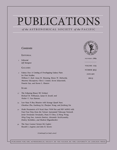
PUBLICATIONS OF THE ASTRONOMICAL SOCIETY OF THE PACIFIC
Elevating the Discourse in Astrophysics and Space SciencePublications of the Astronomical Society of the Pacific is a prestigious journal dedicated to advancing the fields of Astronomy and Astrophysics, as well as Space and Planetary Science. Published by IOP Publishing Ltd, this influential journal plays a critical role in disseminating groundbreaking research and innovative findings. With an impressive Q1 ranking in both related categories according to the 2023 metrics, it is recognized among the top journals in its field. As a vital resource for researchers, professionals, and students alike, the journal covers a range of topics relevant to current astronomical research from 1996 to 2024. Although it does not offer open access options, the journal is highly regarded in academic circles, evidenced by its competitive ranking in Scopus—20th in Astronomy and Astrophysics and 26th in Space and Planetary Science. This commitment to excellence ensures that it remains an essential platform for sharing the latest insights in the ever-evolving universe.
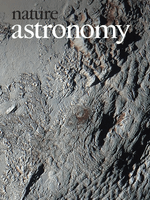
Nature Astronomy
Illuminating the Universe: High-Impact Findings for the Astronomical Community.Nature Astronomy, published by NATURE PORTFOLIO, stands at the forefront of the field of Astronomy and Astrophysics. Since its inception in 2016, this esteemed journal has rapidly ascended to a prestigious position, achieving a Q1 ranking in the Astronomy and Astrophysics category and securing an impressive 6th place out of 90 journals in the Scopus rankings, placing it in the 93rd percentile. With a focus on disseminating pioneering research, Nature Astronomy provides a vital platform for the dissemination of high-quality, impactful findings across various aspects of astronomical science. Researchers, professionals, and students alike will find a wealth of knowledge and innovative perspectives within its pages, enabling them to stay ahead in a rapidly evolving field. Although it does not offer open access, the journal's commitment to excellence and its influence in shaping the future of astronomical research make it an indispensable resource for anyone serious about advancing their understanding of the cosmos.

Open Astronomy
Fostering Global Dialogue in Astronomy and Astrophysics.Open Astronomy is a pioneering journal dedicated to the expansive field of astronomy and astrophysics, published by De Gruyter Poland Sp. z o.o. since 2016. This Open Access journal aims to facilitate the dissemination of high-quality research and stimulate scholarly dialogue among researchers, professionals, and students on a global scale. With a commitment to fostering the accessibility of academic knowledge, Open Astronomy has established itself within reputable categories, achieving a Q3 ranking in Astronomy and Astrophysics and a Q4 position in Space and Planetary Science for 2023. The journal also ranks 66th out of 90 in the Astronomy and Astrophysics category and 84th out of 104 in Space and Planetary Science according to Scopus metrics, indicating its growing influence in the scientific community. Based in Warsaw, Poland, Open Astronomy invites contributions that explore novel discoveries, innovative methodologies, and theoretical advances in the field, making it a vital resource for anyone passionate about the cosmos.
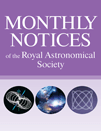
MONTHLY NOTICES OF THE ROYAL ASTRONOMICAL SOCIETY
Unveiling the Mysteries of the Cosmos Since 1913.The MONTHLY NOTICES OF THE ROYAL ASTRONOMICAL SOCIETY (MNRAS), published by Oxford University Press, serves as a premier platform for the dissemination of significant research in the fields of Astronomy, Astrophysics, and Space and Planetary Science. Established in 1913 and with an impressive impact factor reflected in its 2023 Q1 rankings—13th in Earth and Planetary Sciences and 14th in Physics and Astronomy—this journal is renowned for its rigorous peer-reviewed articles, fostering advancements in our understanding of the universe. Researchers, professionals, and students alike benefit from its rich content, which spans a vast array of topics within its scope, from stellar dynamics to planetary formation. While the journal does not currently offer Open Access options, the scholarly contributions published herein are invaluable for pushing the boundaries of contemporary scientific inquiry and ensuring that the latest findings reach an engaged audience globally.